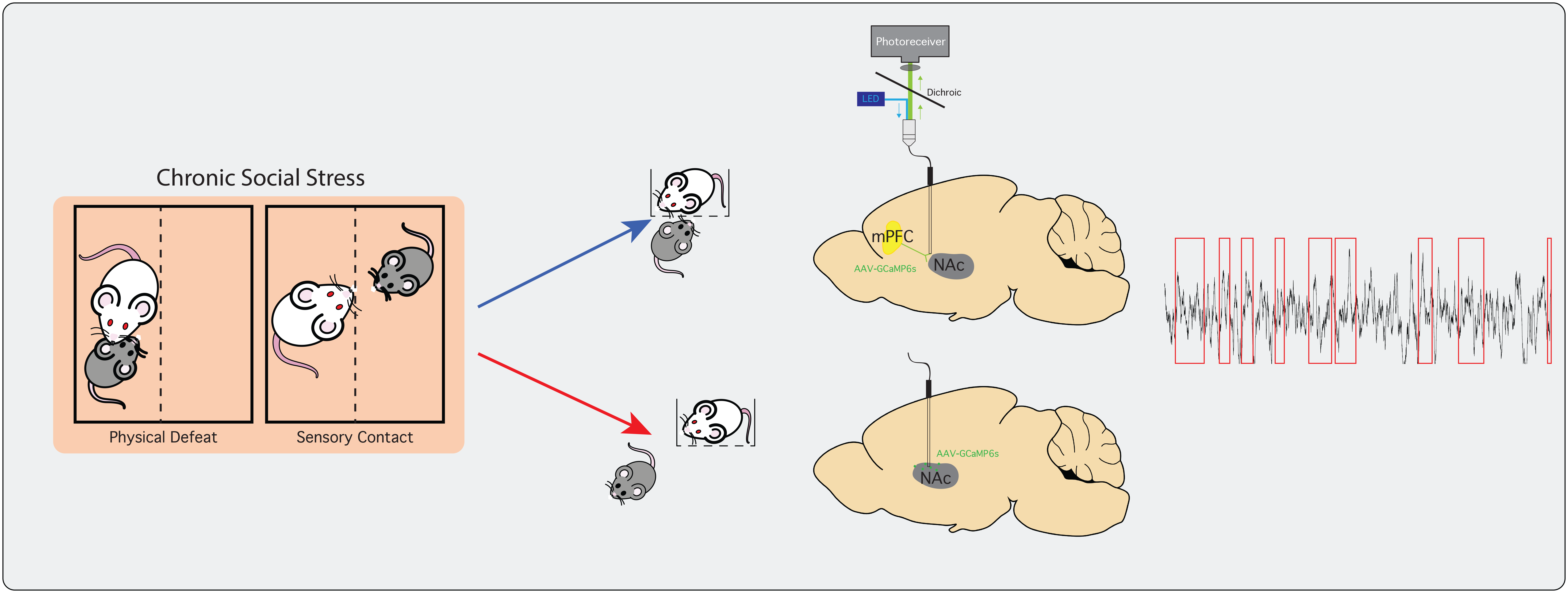Tell us about your research.
Impairments in social functioning are a core component of many stress-related neuropsychiatric conditions including depression, schizophrenia and anxiety disorders. However, not all who are exposed to chronic stressors develop a neuropsychiatric condition. Understanding active mechanisms of stress resilience could be integral for developing new approaches treating and preventing stress-related to neuropsychiatric diseases. While underlying mechanisms of stress-related social dysfunction are not well understood, they are thought to involve the striatum, a stress-sensitive area of the ventral striatum that regulates drives and motivation. The medial prefrontal cortex is also implicated in social processing and the regulation of emotional responsivity––particularly in downstream targets like the striatum. I am using new recording techniques like fiber photometry––a tool that allows me to utilize calcium signaling as a proxy measure of naturally occurring neural activity in freely moving mice to elucidate the roles of these regions in social behavior after chronic social stress.
We use a model of chronic social stress to induce stress phenotypes in mice that we observe in human populations. After chronic social stress, some animals are stress susceptible, exhibiting decreased social behavior while other animals are stress resilient, exhibiting control-like levels of social behavior. In order to understand underlying neural mechanisms of these different stress phenotypes, we are using a technique called fiber photometry. This technique allows us to record neural activity dynamics in cortical and striatal regions that could play a role in motivating social interactions. We can then align social interaction behaviors (example behavioral epochs indicated by the red boxes) to this recorded signal to elucidate the roles of these regions in social behavior after chronic social stress.

What are your motivations behind the choice of your area of research?
My research is motivated by the fact that we have progressed so much in our scientific and clinical knowledge but we still have a lack of understanding of the biological bases of neuropsychiatric disease. The brain is such a vast unknown, which is both overwhelming and exciting––and a major driving force in my dedication to research!
Why did you choose Weill Cornell for your graduate studies?
I chose Weill Cornell for my graduate studies because not only was the research high level and cutting edge, but the community was collaborative and engaging.
What is your proudest accomplishment at Weill Cornell thus far?
My proudest accomplishment during my time thus far has been the way I have been succeeded outside of my comfort zone, learning skills and techniques to enhance and further my research questions. A good example is when early on in joining my thesis lab, I was tasked with building my own photometry. This has pushed me to learn about the techniques and work on necessary coding for analyses.
What awards or honors have you received?
During my time at Weill Cornell, I have received an NSF Graduate Research Fellowship and the Weill Cornell Medicine Jacques Cohenca Predoctoral Fellowship.
What are your plans after you graduate?
I am currently looking for post-doctoral research positions and hope to continue on in academic research.

